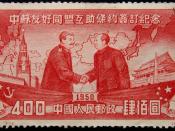The objective of this essay is to discuss totalitarianism, specifically to identify ways in which totalitarianism is 'European' and 'Modern'. The Soviet Union, expressly the period between 1924 and 1953 when Joseph Stalin was Secretary General of the Communist Party of the Soviet Union (CPSU), will be used as an example to highlight that it was an economic and political model born from the modern European experience.
For a country or state to be considered 'modern', it generally needs to undergo a process of transformation from that of a traditional, rural and agrarian society to a secular, urban, industrial society. The term 'modern', in this context, is defined in comparison and in contrast to 'traditional'.
Modern culture or Modernity is an umbrella term for a number of cultural developments that took place primarily in Europe and North America over a period stretching from the 17th century through to our own day.
The core themes that have shaped Modernity have been the secularisation of culture, whereby religious institutions, beliefs, and practices are systematically displaced and substituted with those of reason and science, the acceptance of the individual as the basic unit of society, the emergence of a technological world-view that accompanied the rise of instrumental rationality to a position of pre-eminence, and finally, the development of a liberal culture that flowed from an increasing societal acceptance of liberal democracy .
The effects of these changing conceptions of the nature of society and man lead to two great upheavals in eighteenth century Europe, one political and the other economic. Both culminated in explosive events toward the end of the eighteenth century. The first helped provoke a political revolution in France , and the second, in creating an atmosphere conducive to technological innovation, was one of the chief elements in the emergence of...


